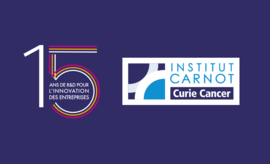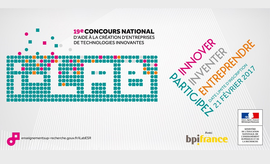Spotlight on business incubation at Institut Curie, a driver of innovation and jobs

In 2021, Institut Curie presented its start-up incubation program, an integrated incubation model that is key to a strategy of leveraging basic research to accelerate the development of innovations in oncology.
|
"CURIE" INCUBATION: KEY FIGURES 28 start-ups created since 2002 More than 330 jobs generated 95% survival rate in 5 years More than 480 M€ raised since creation 200 M€ in total sales since creation More than 50 products available on the market 10 clinical trials underway |
"We are proud of the results we can report today. In addition to reflecting a real incubation strategy that works, these growing indicators highlight our desire to create companies whose societal impact is measurable over the long term," said Cécile Campagne, Director of Institut Curie’s Technology Transfer Office and Deputy Director of Carnot Curie Cancer. "These start-ups are among the most important private partners of Institut Curie in terms of preclinical R&D collaborations, a major evolution that we have been supporting since our Carnot[1] labeling in 2011. The challenge is for these companies to become our key partners in clinical research to bring these cutting-edge innovations to patients."
"Curie" incubation, a springboard for researchers' careers
While the start-ups incubated at Institut Curie are above all synonymous with hope for improved treatments and quality of life for patients, they also contribute to economic outreach and to the development of entrepreneurial vocations. In total, the "Curie" incubation program has generated more than 330 jobs in a wide range of sectors: biotechnology, pharmaceutical development, services, instrumentation, digital health and MedTech...
The dynamics of creating start-ups at Institut Curie has made it possible to offer new career opportunities to experienced researchers, young doctoral students or post-doctoral fellows, and to give rise to vocations. Some have chosen to switch to entrepreneurship while keeping their research position, while others have found their way out of academic research. Scientific consultant, research engineer or even CEO, the positions created are particularly diverse.
explains Cécile Campagne.
The big leap into entrepreneurship: the choice of Inorevia's co-founders
Not all researchers want to keep a foot in the academic world. This is the case of Julien Autebert and Amel Bendali, co-founders of Inorevia. This MedTech company uses microfluidic technology developed at Institut Curie to miniaturize and automate sample preparation protocols, saving laboratories valuable time and money.
Both former researchers in Jean-Louis Viovy's team, now headed by Stéphanie Descroix[2], their meeting in 2016 brought to light the idea of bringing this innovative microfluidics research to life. "We wanted to keep working in biology but through a new spectrum: that of entrepreneurship. The idea of creating Inorevia was born from this common desire to bring concrete and useful applications to the biomedical world," says Julien Autebert, CEO of the company, which now has 20 employees.
"Creating a start-up is a great adventure, both professionally and on a human level. This dynamic, which allows us to exchange ideas with investors, biologists, production and marketing teams in the same day, is particularly stimulating", enthuses the CEO of Inorevia. With partners and first customers all over the world, the start-up aims to accelerate its commercial expansion in the coming months.
| Watch our video: "Institut Curie, a springboard for researchers' careers" : Interview with Julien Autebert, CEO of Inorevia |
Growing ambitions for innovation made in CurieWith six start-up projects currently being incubated, Institut Curie should exceed the milestone of 30 biotech and medtech companies created in its laboratories by 2023, and by 2027, the threshold of 1 billion euros raised by these companies, "two milestones that will recognize the relevance of Institut Curie's strategy, the quality of its teams and its potential for innovation, and will attest to the advantages of the Carnot label and the unique development mandates entrusted to it by Inserm and CNRS," concludes Amaury Martin, Institut Curie's Deputy Director in charge of Valorization and Director of Carnot Curie Cancer. As part of the establishment project currently being finalized, Institut Curie intends to strengthen its incubation system in several ways:
|
[1] Institut Curie obtained the Carnot label in 2011, which was renewed in 2016 and 2020. The Carnot label is a label of excellence awarded to academic research institutes that have demonstrated quality and involvement in partnership research.
[2] Jean-Louis Viovy, Emeritus Research Director at the Physical Chemistry Curie laboratory, and Stéphanie Descroix, head of the "Macromolecules and Microsystems in Biology and Medicine" team at Institut Curie (UMR168 CNRS/Sorbonne University/Institut Curie), participated in the company's co-founding.





